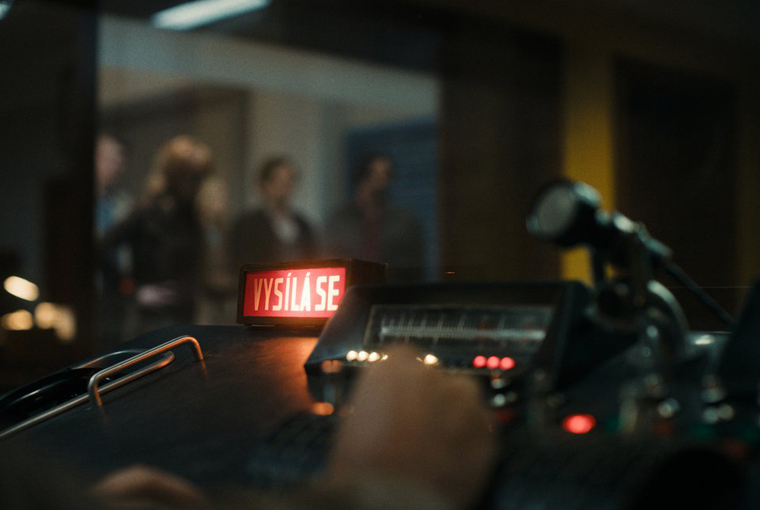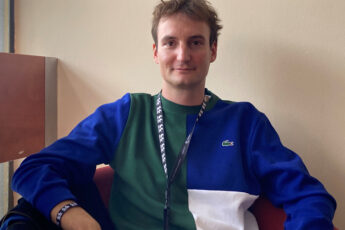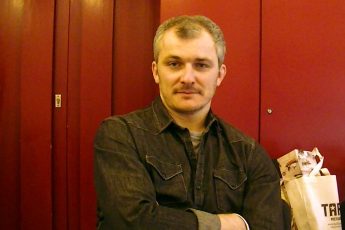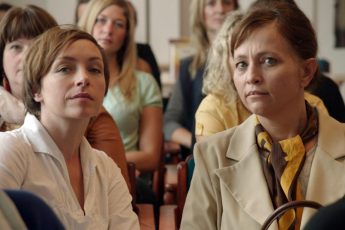Radio Waves in a Period Piece
Jiří Mádl’s Waves (Vlny, 2024)
Vol. 150 (December 2024) by Tanya Silverman
The new historical drama Waves (Vlny, 2024) by Jiří Mádl depicts a salient moment of modern Czech (and Slovak) history – the Prague Spring –, and how that moment was conveyed through Czechoslovak Radio. Based on true events, Waves follows the young Tomáš Havlík (Vojtěch Vodochodský) as he begins working as a technician for the radio’s International Life office overseen by editor-in-chief Milan Weiner (Stanislav Majer), a respected journalist and inspirational advocate of free speech. Soon enough, the secret police approach Tomáš to act as an informant about the radio journalists’ suspicious activities. The plot of Waves progresses through the 1967–1968 events of Czechoslovakia under the Communist regime, naturally encompassing the passing of the Prague Spring liberalizing reforms under the leadership of Alexander Dubček that impel the August 1968 invasion of Warsaw Pact troops. The film follows how amid the invasion, Tomáš and the International Life journalists figured out ways to keep broadcasting, actively circumventing attacks on the radio station. Waves contains many instances of interspersed documentary imagery, featuring public rallies around Dubček in Prague as well as historical footage of the invasion.
A millennial following in the footsteps of his elder peers, Mádl continues the post-Communist tradition of period pieces that depict the local Communist-era past, a practice carried out by Jan Hřebejk with his 1999 Cozy Dens (Pelíšky) and 2003 Pupendo and Jan Svěrák with his 1996 Kolya, both of whom Mádl admired greatly as he was growing up.1 Switching roles, Mádl said he thought a lot about younger audiences when he was making Waves.2 These thoughts appear to pervade the beginning of the film, which starts off with the blackout at Prague’s Strahov dormitory on 31 October 1967 that prompted spontaneous, candle-lit protests in the streets, which were quickly crushed by the police. The choice in protagonists also provides youth appeal: the audience sees the activities of the International Life office largely through the lens of Tomáš, while his teenage brother Pavel (Ondřej Stupka) engages in social circuits of young people whose members stage protests and disseminate leaflets.
Sensibly, in a historical drama about a technology that features a technician as its main hero, the mise-en-scène is replete with period apparatuses like antique radio sets and other analogue devices. The camera frequently dwells on the rotations of reel-to-reel recordings and manual dialing on rotary telephones. In terms of using audio to fabricate the era, the soundtrack of Waves includes the Czech hits of the Prague Spring as well as contemporaneous Western music that connoted a toying with taboos. During the scene when Tomáš first meets his radio coworkers, The Ronettes’ “Be My Baby” plays on a turntable in the office, sparking a minor row between the colleagues whereby three journalists sing along to the English words to the ire of their colleague, Luboš Dobrovský (Martin Hofmann). Later on, Marta Kubišová’s “Nechte zvony znít” carries through a series of historical and narrative events: President Antonín Novotný resigns in March 1968, sparking a dormitory party after the students hear the news on the radio; a public announcement about the abolition of censorship cuts to a toast among the International Life crew.
Waves offers a fair amount of contextualization for those not deeply in the know about the history of Czechoslovakia, the 1960s liberalization of the Communist regime under Dubček, or some of the cultural nuances of that time. There are voice-overs and superimposed titles that illustrate information about the important dates and locations of the Prague Spring and its termination. Lines from the script quote the significant slogan of that time, “Socialism with a human face,” and go over which Warsaw Pact countries sent troops to participate in the Soviet-led 1968 invasion. Further, the film’s dialogue skillfully draws attention to how “Svoboda,” the surname of Novotný’s presidential successor, Ludvík Svoboda, literally derives from the Czech term for freedom.
Waves was released to considerable acclaim, with reports of standing ovations at Karlovy Vary 2024 flanking a number of awards, not to mention a submission for a foreign film Oscar. Its popularity is probably in part due to comparisons between the history it portrays and Russia’s full-scale invasion of Ukraine – a factor that the director admitted made the movie “too timely,” in fact, insofar as he had come up with its premise around 2012.3 The day of the invasion in February 2022 was actually when support from the Czech Film Fund for Waves came through.4 Alongside the historical context’s significance, content-wise, the film’s focus on Czech characters taking action amid the Soviet-led invasion offers an alternative portrayal of heroism when compared to prior popular period pieces, for example, the middle-aged men of Hřebejk’s films enacting what Veronika Pehe identifies as “petty heroism” through their minor, private gestures of resistance.5 Like Waves, Hřebejk’s Cozy Dens takes place in the era surrounding the 1968 invasion, but it revolves around two families in their Prague apartments. In Cozy Dens, the staunchest forms of rebellion occur when Mr. Kraus (Jiří Kodět), the anti-Communist patriarch of one family, shouts profanities from his balcony to the workers of the world, in Czech, and then to the invading troops, in Russian.6
While Waves succeeds at finding an apt angle through which to tell the story of the Prague Spring, certain aspects of the storytelling feel underwhelming. Turning points when characters must respond to difficult choices or enact their gumption do carry a great degree of tenseness or urgency. Yet when the romantic interests between Tomáš and International Life journalist Věra Šťovíčková-Heroldová (Táňa Pauhofová) gain traction, the tenderness comes off as subdued. The instances of augmented brotherly love feel similarly staid. As Tomáš addresses Pavel over the riskiness of his activist pursuits, Tomáš’s expressions of care and concern do not convincingly override his generally deadpan demeanor. There is emphasis on the collective mission and values of the journalists, however, as individuals, these characters lack a degree of dynamism and autonomy. Věra initially gives impressions of being socially aloof and reserved, and the tactic of developing her personality by highlighting her interest in cooking ultimately feels more tactical than effectual. The film succeeds more at giving an overview of the Prague Spring events than it does at humanizing the heroes it constructs to respond to them. As much as their brave virtues and public interest prevail, they do not attain a degree of relatability or warmth akin to the more domesticated characters of a Hřebejk period piece. That said, despite some of its flatness, Waves is an accessible film that narrativizes an important period of Czechoslovak history through clever audio-visual techniques.
- Willoughby, Ian. (2024). Diving into Waves: Jiří Mádl on massive hit “1968” film. Radio Prague International. https://english.radio.cz/diving-waves-jiri-madl-massive-hit-1968-film-8838536. ↩︎
- Ibid. ↩︎
- Avella, F. (2024). Jiří Mádl On Creating the Sweeping, Cinematic “Waves,” the Czechia Oscar Entry. The Contending. https://www.youtube.com/watch?v=fCldyhen0Us&t=299s (3:53–4:25) ↩︎
- Willoughby, Ian. (2024). Diving into Waves: Jiří Mádl on massive hit “1968” film. Radio Prague International. https://english.radio.cz/diving-waves-jiri-madl-massive-hit-1968-film-8838536. ↩︎
- Pehe, V. (2020). Velvet retro: Postsocialist nostalgia and the politics of heroism in Czech popular culture. Berghahn Books; 78, 84–85. ↩︎
- Kraus regularly condemns the Communist ideology and Soviet influence privately within his home, and there are a couple of instances when he decides to declare his views loudly from the balcony. At one point, Kraus yells in Czech, “Workers of the world, fuck off!” (“Proletáři všech zemí, vyližte si prdel!“). Later, in the wake of the August 1968 invasion, he repeatedly yells in Russian, “Bastards!” (using the Russian term “durák,” which his daughter offers as an equivalent of the Czech “hajzl”). Aside from offering Kraus a sense of catharsis, these messages likely do not reach the intended recipients. ↩︎




Leave a Comment